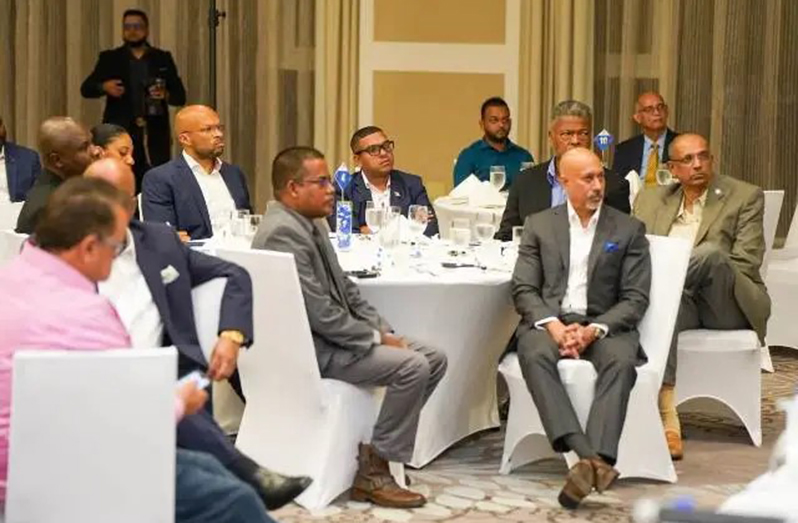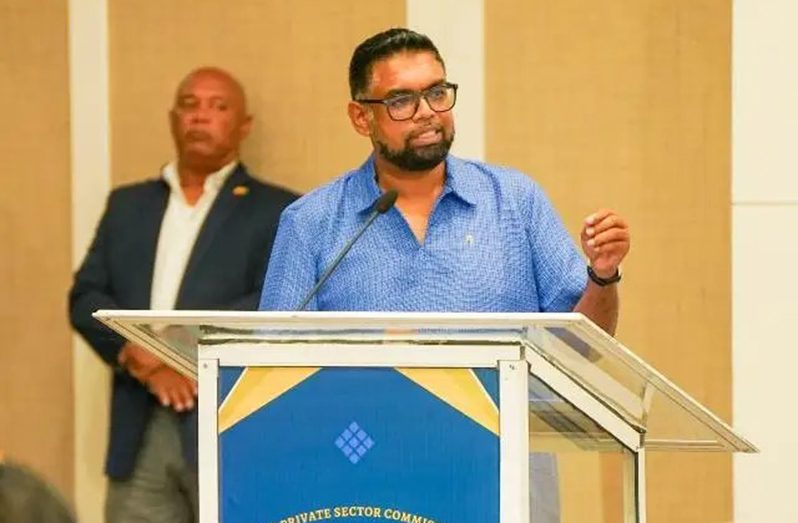–President Ali tells business community; urges stakeholders to reorient their operations to deal with the scale of investments coming
–highlights opportunity for establishment of national distribution company, potential for eco-tourism as a luxury product
By Feona Morrison
PRESIDENT Dr Irfaan Ali has said that there needs to be less talk and more action within the business community.
The President, during his address at the Private Sector Commission (PSC) Corporate Dinner on Monday night, called on private sector stakeholders to reposition their businesses to deal with a wide array of investment opportunities coming to Guyana—the fastest-growing economy in the world.
Dr Ali offered this advice regarding the investment opportunities the government is trying to create for local businesses over the next five to 10 years.
“I want you guys to understand the scale of development and investment that is coming our way. And to reorient your businesses to deal with that scale,” the Head of State said.

He emphasised: “I think there is much more synergy we can get through with more forward-looking approaches, even though the government is pleased that local investors made up 60 per cent of the total investment agreement signed by the Guyana Office for Investment (Go-Invest).”
Apart from the oil and gas industry, which the President predicts “will build its own momentum,” he mentioned other lucrative commercial prospects that are about to arise.
Regarding gold mining, President Ali disclosed that he recently met with stakeholders and the prospects are bright.
Providing some insight on that company’s intention, the Guyanese leader revealed: “They are coming back on stream and the type of numbers you will hear announced soon would tell you that we may very well have, from what we are seeing, a mine once again the size of Omai.”
There will also be opportunities in the transportation and logistics industry, with “enormous” spinoffs expected, the Guyanese leader pointed out. Aside from that, he said there are a few other items the government is currently closely scrutinising.
With the exception of energy costs, President Ali stated that Guyana is competitive in every area.
Due to the high cost of energy, he said the nation is unable to develop a manufacturing sector that is competitive.
He added: “As a result of the cost of energy there are some fiscal incentives that are given to make up for that competitive loss in the cost of energy now. Do not expect those fiscal incentives to remain the same when the cost of energy comes down by 50 per cent.”
For Guyana’s energy sector to flourish in the future, developing alternative renewable energies including solar, wind, hydropower, and biomass technologies is still a top priority for the government. Over the next few years, the government has pledged to cut the cost of electricity by at least 50 per cent.
LUXURY ECO-TOURISM
Outside of manufacturing, according to the President, hardly any money was spent in the past on tourism because people did not know much about Guyana.
“We did not capitalise on the opportunity because we did not have the type of resources to market our country. Our country was very little known, we did not have a natural pull factor into the country,” Dr Ali said.
He said, however, that the government is spending a lot of money marketing the nation now that it has a draw factor; investors are coming from all over the world and it is featured prominently in major newspapers, magazines, and newscasts.

President Ali stated that the Punta Cana International Airport and a group from the United Kingdom (UK) have submitted ideas to the government about marketing Guyana as a luxury travel destination similar to that in Punta Cana, Dominican Republic (DR).
“That is the market we want to attract. It is going to take some time, but this is where we are heading. We have to think big and act big. There is no shortcut to this. We have to bite the bullet. And we are going to have incentives…,” Dr Ali posited.
He continued: “And our luxury market is not Dubai luxury. We’re [not] bringing you here with hotels and the best shopping experience and so…”
According to him, Guyana’s market is the “luxury of being at one with nature,” a different luxury that the market badly wants.
“So, when I speak about luxury here is eco-luxury,” he said, adding that the private sector has to look at investing heavily in tourism.
The Head of State went on to say: “I want to see the local private sector investing in tourism because we will back the investment with marketing, infrastructure, and fiscal incentives as a government. This is an important feature for us. We have developed our own eco brand here in Guyana, one that speaks to a number of issues such as climate and the environment.”
With the intention of stimulating the hospitality industry even more, stakeholders are about to begin building a large, luxurious hotel on Carifesta Avenue in Georgetown. Together with state-of-the-art meeting and entertainment facilities, it will have a contemporary boardwalk along the seawall.
“We have people who are designers, and we have people in the interior who do specific crafts, more local types of products. We have to get the larger companies to adopt these small innovators and bring them into their business model, and help them to push their products. The tourism sector has major opportunities. We need the private sector to move into that direction and invest in this sector,” President Ali said.
AGRICULTURE
The President then addressed the agricultural industry, reminding everyone of the government’s intention to establish Guyana as a regional hub.
“The government is already putting resources into the establishment of a regional food hub. But why can’t the private sector come together and say, ‘We are going to start by being the major buyer and distributor of all the produce in Guyana?’” he asked.
Acknowledging that Guyana presently lacks the production capability to cater to the needs of the entire Caribbean region, he proposed that the private sector undertake a trial project to establish a distribution hub that would source goods from northern Brazil and meet regional demands.
“Let us build our own food distribution hub from Guyana by the Guyanese private sector so we can get our food into the diaspora market, and into the Caribbean market. We have to move to the position of, when we have excesses, we move to do the processing and the pulping of fruits and all of these things.
“You all need to come together, create a national distribution company that brings all the produce, integrate with northern Brazil. We are ready to embrace and support this,” the Head of Sate said.
He predicted that by 2026, Guyana would be completely self-sufficient.
President Ali said by the end of this year, Guyana should be able to produce all of its red beans and black eye peas locally, and after that, should be able to tap into the Jamaican and other markets.
Additionally, the Head of State said that agro-processing and packaging are also important parts of the equation.
He said too that an agro-chemical plant will be built in Guyana by the end of 2025 as part of the first gas-to-shore project.
Dr Ali assured attendees that the government is willing to co-invest in establishing this facility.











